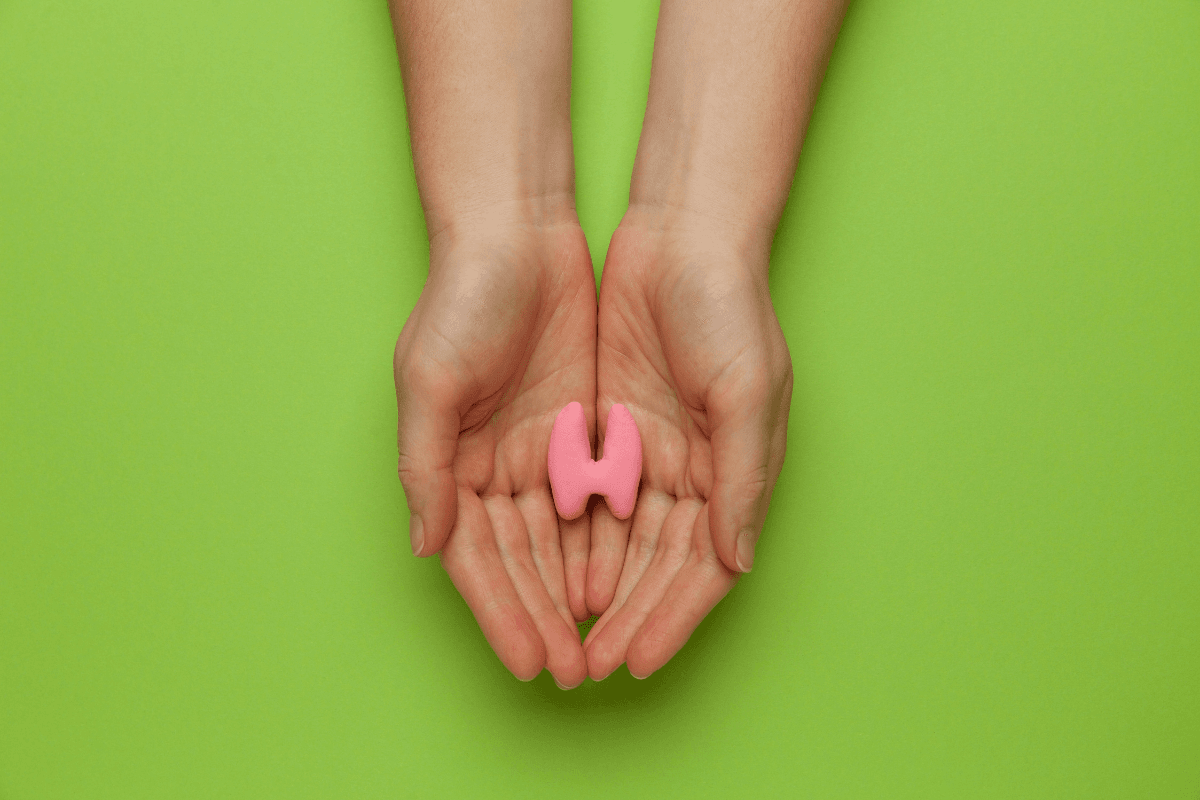Our thyroid gland plays an important role in our bodies and whilst no specific food or supplement can treat a thyroid disorder, there are some things worth mentioning that can optimise function. Dietitian Aislinn explains all.
What is the thyroid gland and what are its functions?
The thyroid gland is located at the front of the neck and regulates metabolism, cholesterol and calcium blood levels, body temperature, brain development and the heart and nervous system (1).
What is hypothyroidism?
Hypothyroidism, or underactive thyroid, occurs when the thyroid doesn’t create and release enough thyroid hormones. Hypothyroidism can slow down metabolism causing weight gain, fatigue, hair loss, dry skin, concentration difficulties, low libido, menstrual disturbances and low mood (1).
What is hyperthyroidism?
Hyperthyroidism, or overactive thyroid, occurs when the thyroid produces too much thyroid hormones. This can accelerate your body’s metabolism, causing unintentional weight loss and a rapid or irregular heartbeat (1).
What are the key nutrients to optimise thyroid function?
It is important to follow a healthy balanced diet that limits processed foods, and is rich in fruit and vegetables, pulses, protein, wholegrains, fluids and healthy fats.
Iodine
Iodine is essential for normal thyroid function as thyroid hormones are made from iodine. Caution should be taken if you have thyroid disease and are considering taking an iodine supplement while taking levothyroxine. If you have hypothyroidism that isn’t caused by iodine deficiency, then taking iodine supplements could make symptoms worse (2, 3). Always speak to your GP before commencing an iodine supplement. Sources of iodine include fish, dairy products, eggs, meat and poultry, bread, nuts, fruit and vegetables, and seaweed (4, 5).
Vitamin D
Vitamin D insufficiency is high in those with hypothyroidism and bone loss is common in those with hyperthyroidism. Vitamin D is essential for calcium absorption and therefore bone health. It is very difficult to get enough vitamin D from food in Ireland; therefore, we are reliant on the sun’s UVB rays to make vitamin D in our skin during the summer. It is advised that everyone in Ireland takes a vitamin D supplement from September to April. Vitamin D sources include oily fish, eggs, UV treated mushrooms and fortified foods.
Selenium
Selenium is also needed for normal thyroid function. A selenium supplement is not often needed and can be harmful to health. Selenium sources include brazil nuts, cashew nuts, lentils, mackerel, tuna, crab, lobster, turkey, mushrooms, white pasta and brown bread (1, 3).
Vitamin B12
Vitamin B12 insufficiency may be higher in those with autoimmune hypo or hyperthyroidism. Vitamin B12 is essential for metabolism, normal red blood cell production and nerve function. Sources include, meat dairy, fish, offal, fortified foods and nutritional yeast (1, 3).
Zinc
Zinc is involved in normal thyroid hormone creation and function. Zinc sources include oysters, crustaceans, meat and poultry, dairy, cashew nuts and seeds (3).
Iron
There is a higher rate of iron deficiency in those with hypothyroidism. Iron sources include red meat, offal, eggs, fortified foods, beans, pulses, tofu, dark green vegetables, nuts and seeds. Vitamin C is needed for iron absorption; therefore, eating iron rich foods with vitamin C rich foods (e.g. citrus fruits or peppers) will aid iron absorption. Tannins found in tea, coffee or red wine can decrease iron absorption (3).
Goitrogens
Goitrogens are natural compounds found in some foods that can reduce the function of thyroid hormones. Vegetables such as broccoli, cabbage, cauliflower, kale, spinach, millet, sweet potato and bok choi contain goitrogens, but heating or cooking these vegetables can reduce the effect of goitrogens. In general, it is not an issue for people living in Ireland as consumption would need to be very high for it to be a concern to health. Soya or foods/supplements high in calcium can reduce Levothyroxine absorption, so be sure to take Levothyroxine on an empty stomach. There is no need to restrict the amount of soya or calcium in your diet (1-3).
Exercise
150 minutes of exercise is recommended each week. Regular exercise can help with weight gain, fatigue, mood, anxiety and sleep (1).
References
Thyroid Disease and Diet — Nutrition Plays a Part in Maintaining Thyroid Health. Today’sDietitian.com. https://www.todaysdietitian.com/newarchives/070112p40.shtml. Accessed 10/11/21.
Thyroid and diet factsheet. BTF-Thyroid.com. https://www.btf-thyroid.org/thyroid-and-diet-factsheet. Accessed 10/11/21.
Nutrition for Thyroid Health. TheFoodMedic.co.uk. https://thefoodmedic.co.uk/2021/05/nutrition-for-thyroid-health/. Accessed 10/11/21.
Iodine: Food Fact Sheet. BDA.co.uk. https://www.bda.uk.com/resource/iodine.html. Accessed 11/11/21.
Iodine. National Institutes of Health. https://ods.od.nih.gov/factsheets/Iodine-HealthProfessional/. Accessed 11/11/21.















